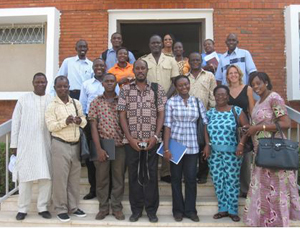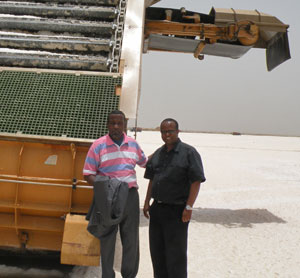Field Stories
From sea to table: Senegal’s salt heroes tackle iodine deficiency disorders
December 5, 2023
WP_Term Object
(
[term_id] => 49
[name] => Field Stories
[slug] => all-field-stories
[term_group] => 0
[term_taxonomy_id] => 49
[taxonomy] => news-category
[description] => Discover the personal stories of people whose lives have been impacted by better nutrition, and those working tirelessly to deliver it.
[parent] => 0
[count] => 180
[filter] => raw
)
South-to-South mentoring: stepping up salt iodization to improve health in Africa
For three years, the Micronutrient Initiative (MI) has been facilitating the cross-sharing of program experiences between salt processors in Africa to help build and sustain salt iodization in countries where efforts have stalled.
Posted on June 21, 2012


Often a little mentoring can go a very long way. For three years, the Micronutrient Initiative (MI) has been facilitating the cross-sharing of program experiences between salt processors in Africa to help build and sustain salt iodization in countries where efforts have stalled. The results of these knowledge-exchanges are turning out to be very promising.
In Ghana, Mozambique and Ethiopia, efforts to implement sustained USI among salt processors had stalled. Despite different plans and pilot projects, meetings and legislative efforts, USI had not gained traction.
In Senegal, with support from the Cellule de Lutte contre la Malnutrition (CLM) and MI, the small-scale salt producers have been successful in making iodization efforts part of an improved way of working together.
Their efforts have been recognized on the continent as one of the most successful and sustained USI programs. There are similarities to the salt industry in the four countries but only Senegal had really seen USI success.
In 2009, 2010 and 2011, MI provided support for the CLM and the Senegal salt processors to host delegations of government officials and salt producers from Mozambique, Ghana and Ethiopia for South-to South cross-sharing of ideas on salt iodization.


During each of the visits, MI and CLM staff briefed the delegations on Senegal’s National Programme on Universal Salt Iodization (USI), highlighting the roles of partners involved in the USI programme.
They also mentored delegations on how to set up effective salt iodization programmes in their home countries that would be rooted in national policies, government ownership and strong coordination.
One of the reasons salt iodization has been so successful in Senegal is that small-scale salt producers work together in cooperatives and support each other and are backed-up with a strong government coordination and enforcement mechanism.
Delegates met with members of the federation of “Groupements d’intérêt économique” or GIEs to discuss systems that help producers continue to procure potassium iodate, used in salt iodization.
They also visited salt producing sites in the Kaolack region and salt fields in Fatick, where they observed the work of small producer cooperatives and production monitoring mechanisms.
Delegates learned valuable lessons about how vital coordination amongst USI partners is and the importance of quality control on imported and exported iodized salt to ensure it has been properly iodized. Most importantly, they now realize how important salt iodization is to the human health, especially for mothers and young children.
While Ethiopian delegation member, His Excellency H E Hassen Abdulkadir, Ethiopian Ambassador to Senegal, who is himself from Ethiopia’s salt-producing area, knew how important the salt industry was to his region economically, he didn’t know how important iodization was to the health of his country’s people.There is no way to reverse the damage done due to a lack of iodine.
“I did not know how important iodine was for brain development and how important it was for children to achieve in school,” said Hassen. “But it didn’t take me long to become convinced that we needed to step up our efforts to iodize the salt we were producing.”
Since the visits, MI and its salt iodization partners in Ethiopia continue to work together to set up iodization at Lake Afdera and ensure salt produced there is adequately iodized.
The Government of Ethiopia also published its new legislation on the mandatory iodization of salt in March 2011.
MI was asked by Mozambique’s Vice Minister of Industry and Commence Kenneth Viagem Marizane to collaborate on the development of a National Action Plan for USI for presentation to Mozambique’s Cabinet.
MI staff have also been working with the Ghanaian delegation and local salt iodization partners on a plan to help develop a USI program in Ghana.
Related Stories: